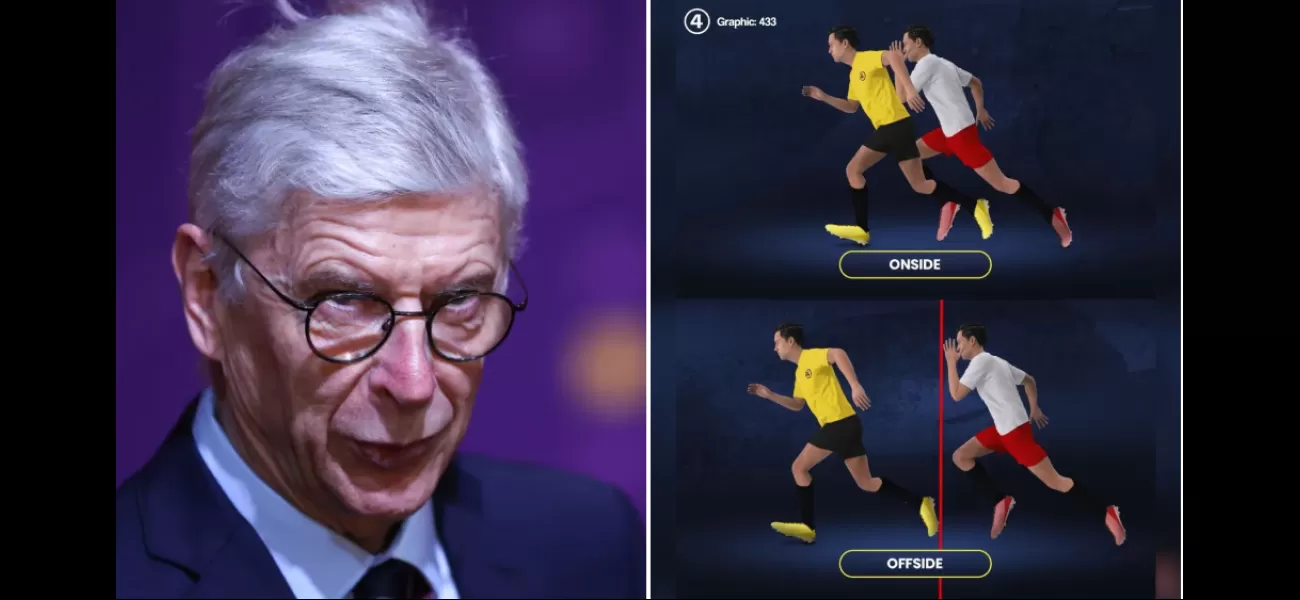Wenger criticized for proposing a 'terrible' new offside rule.
'The game will suffer greatly.'
May 23rd 2024.

In recent news, it has been reported that former Arsenal manager Arsene Wenger is pushing for a change to the offside rule, which has remained unchanged for 30 years. Wenger, who now holds an administrative role at FIFA, believes that there should be a new rule requiring a "daylight" gap between the defender and attacker for the latter to be deemed offside.
This proposed change has already been trialled in several countries and Wenger is now pushing for it to be implemented on a wider scale, with discussions taking place with football's law-makers IFAB. However, not everyone is in agreement with this idea. Former England and Liverpool defender Jamie Carragher has slammed the proposal, stating that it would give an unfair advantage to forwards and lead to teams defending differently.
Carragher's concerns are echoed by other critics, who argue that this change could result in more negative and defensive tactics being employed by teams. Even FIFA has stated that they will continue to assess the results of the trials and discuss them with relevant stakeholders before making any decisions.
Wenger first publicly discussed his plan to change the offside rule in 2020, following a controversial incident involving video assistant referee (VAR). He believes that there is room for improvement in the current rule, which often leads to decisions being made based on a fraction of a centimetre.
Despite the backlash, Wenger remains committed to continuously improving the game and is open to debate and discussion on the matter. He is not alone in his views, as former Wolves manager Nuno Espirito Santo has also expressed support for the proposed change.
However, not all parties are in favor. Premier League clubs are set to vote on the future of VAR, with some, like Wolves, calling for its removal. This is just one of the many ongoing debates and discussions surrounding the ever-evolving world of football.
This proposed change has already been trialled in several countries and Wenger is now pushing for it to be implemented on a wider scale, with discussions taking place with football's law-makers IFAB. However, not everyone is in agreement with this idea. Former England and Liverpool defender Jamie Carragher has slammed the proposal, stating that it would give an unfair advantage to forwards and lead to teams defending differently.
Carragher's concerns are echoed by other critics, who argue that this change could result in more negative and defensive tactics being employed by teams. Even FIFA has stated that they will continue to assess the results of the trials and discuss them with relevant stakeholders before making any decisions.
Wenger first publicly discussed his plan to change the offside rule in 2020, following a controversial incident involving video assistant referee (VAR). He believes that there is room for improvement in the current rule, which often leads to decisions being made based on a fraction of a centimetre.
Despite the backlash, Wenger remains committed to continuously improving the game and is open to debate and discussion on the matter. He is not alone in his views, as former Wolves manager Nuno Espirito Santo has also expressed support for the proposed change.
However, not all parties are in favor. Premier League clubs are set to vote on the future of VAR, with some, like Wolves, calling for its removal. This is just one of the many ongoing debates and discussions surrounding the ever-evolving world of football.
[This article has been trending online recently and has been generated with AI. Your feed is customized.]
[Generative AI is experimental.]
0
0
Submit Comment





